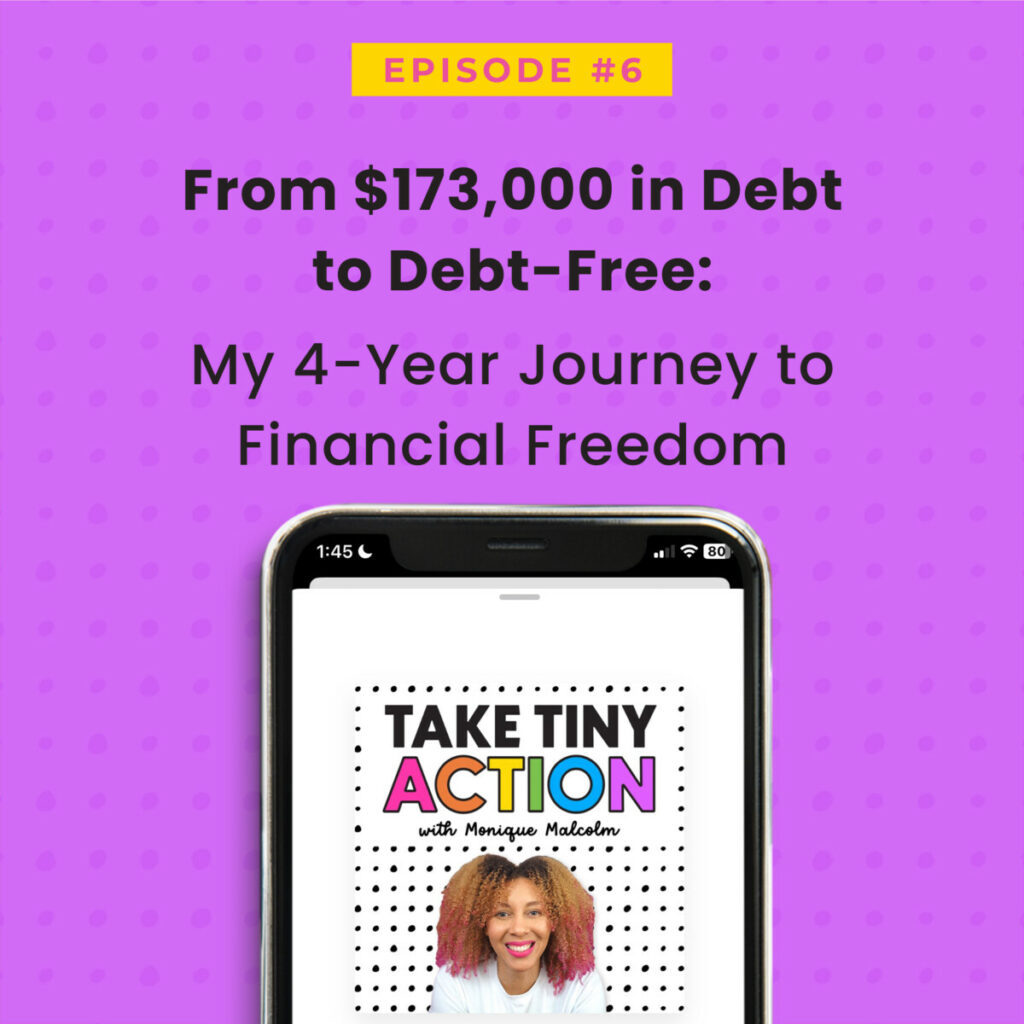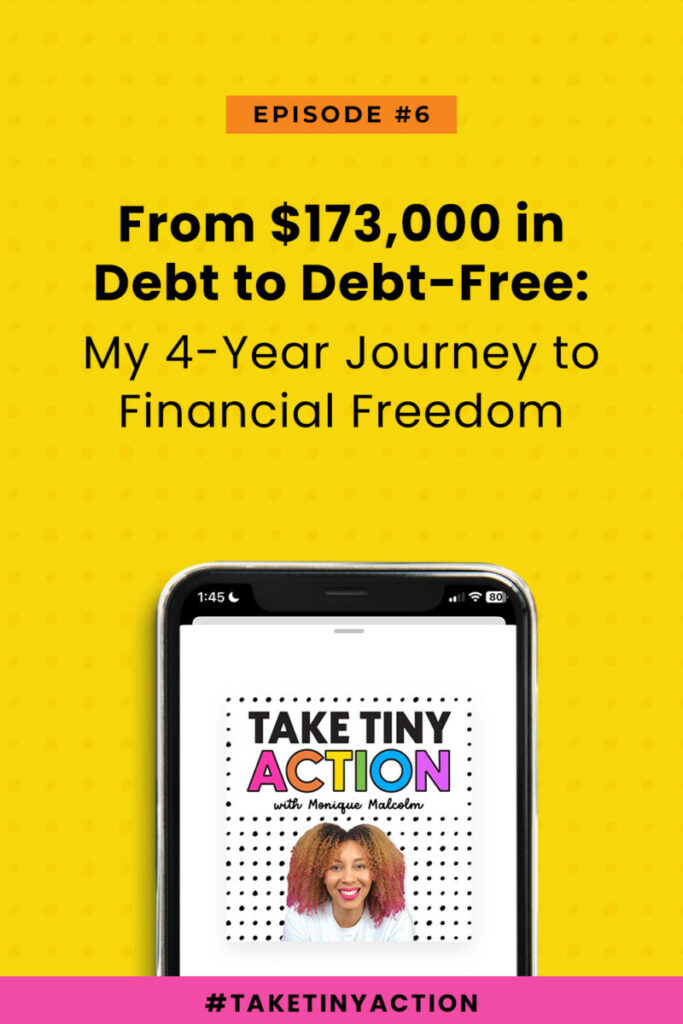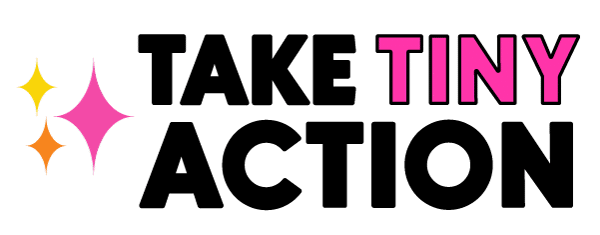
Have you ever felt weighed down by debt? The constant worry, the sleepless nights, the feeling that you’ll never dig yourself out? Now imagine paying off a staggering $173,000 in under four years and finally achieving financial freedom. In this episode, I’m sharing my journey to become debt-free, along with the actionable lessons learned that can help you achieve your own financial goals.
Why am I sharing this?
Seeing what has been possible for others expands the limits of what I believe is possible for myself. I hope that sharing my journey inspires others to get out of debt.
The Starting Point
How do you accumulate $173,000 dollars in debt? Well, it turns out it’s actually quite easy. I think a better question is, “Why is it so normalized to be in this amount of debt?” I have lots of thoughts on this, but it is a topic for another podcast episode.
Here’s our debt breakdown:
- Student loans – Approx. $110,000
- Credit cards – $34,000
- Car loan – $21,000
- Miscellaneous installment loans
How did we get here?
- My husband and I did not have a solid foundation in financial literacy. We understood the basics (work, have a bank account, and spend money) but conceptually didn’t have a grasp on how to manage our money. We definitely didn’t know anything about making money work for us.
- We didn’t understand how expensive debt is and how quickly interest can accumulate.
- We spent more than we had.
- We had a medical crisis and job loss that happened at the same time.
- We ignored the reality of our financial situation because it was too uncomfortable to face. Don’t do this! Not knowing how bad things are changes nothing. You actually rob yourself of the opportunity to make a change.
What changed?
In December 2018, I had a “Come to Jesus” moment. I don’t recall the actual trigger, but I felt significantly weighed down and ashamed about our debt. My Wells Fargo credit card had a high monthly payment ($400+), most of which went to interest. It felt unsustainable to continue paying out so much money every month to creditors. I needed to find a way to start paying down the debt.
The Plan
Throughout our financial journey, we used a variety of strategies to pay off our debt. Some of the strategies are fairly common, but a few are unconventional.
We set our own money rules.
I think it is important to figure out a few rules for how you want to handle your money when you’re on a financial journey. These rules are specific to you, your goals, and your lifestyle. For us, saving while prioritizing debt paydown was important.
Our money rules:
- Pay 20% of cash influxes (tax returns, bonuses, income spikes from my business) into my emergency fund.
- Cover all upcoming expenses.
- Apply any leftover money to the smallest debt, aka the debt snowball method.
Following these rules lessened the sting of paying back thousands of dollars. I didn’t feel like all of my money was going to debt payoff since some of it went into savings.
Organized all of our debts in a debt reduction spreadsheet
I found a free debt reduction spreadsheet that I swear by. It helped me understand the complete picture of our debt. My favorite thing about this spreadsheet is that it calculated how long it would take you to pay off your debt based on your chosen strategy and how much extra money you could pay monthly.
We utilized the snowball method to jumpstart the momentum.
I learned this strategy from Dave Ramsey. With the snowball method, you line your debts from smallest to largest. Then, you pay as much as possible to your smallest balance while paying the minimum amount on every other obligation.
We used a zero-interest credit card balance transfer promotion to pay off our high-interest credit card without interest.
This was a significant turning point in our journey. My Wells Fargo credit card balance was crazy high, and the interest made me want to cry. I used the transfer, which made our final and most expensive credit card debt payable with 0 interest.
**Pro Tip** Read all the details before using a balance transfer. They aren’t free (fees are usually a percentage of the transferred amount), and the offers have an expiration date. I only recommend doing this if you have a solid plan to pay it off before the special offer runs out.
I learned to budget with You Need A Budget.
I didn’t find YNAB until December 2019. Before that, we weren’t budgeting. I had a loose understanding of what we needed every month to pay our expenses, but I wasn’t dialed into the numbers. Learning to budget by following YNAB’s four money rules was a game changer. I was able to set monthly targets for spending and track our debt payoff progress in one place.
Took advantage of the student loan payment pause.
After realizing we were ahead of schedule on our debt payoff journey, I switched our focus to paying down the student loans while the interest payments had been paused. It made sense to me that we wouldn’t get another opportunity to make a dent in the loans, with our entire payment going toward the principal balance.
Difficulties and Challenges
In every journey, there are difficulties and challenges. Our journey was no exception. Though we didn’t experience any significant setbacks, there were challenges. Most of them were related to mindset shifts that I needed to make.
My first challenge was learning to let go of the guilt and shame I was carrying around my debt. I had to learn to forgive myself for past financial mistakes.
Another challenge was staying disciplined when I wanted to do something else with our money. One giant mental hurdle you have to get over is the feeling that you could be doing something ‘better’ with your money instead of paying off debt. There is nothing better. Paying off your debt is the best thing you can do for your future self.
The Results
By August of 2022, my husband and I had paid off over $173,000+ in debt. It is an amazing accomplishment, but that’s not all that happened. We had other major financial wins.
- We have a positive net worth for the first time in our adult lives.
- We bought our first house in 2020.
- We opened Roth IRAs and started maxing them out.
- We opened a traditional brokerage account and regularly investment in them.
Lessons Learned
You can learn several lessons when it comes to managing your finances and paying off debt.
It’s never too late to start. No matter how much debt you have or how long you’ve had it, it’s never too late to start paying it off. Every tiny step you take towards paying off your debt adds up over time.
Consistency is key. Paying off debt requires consistent effort and dedication. You may encounter setbacks or obstacles along the way, but it’s important to stay focused on your goal and keep making progress.
Know your numbers. You can’t get out of debt if you don’t have a clear picture of your financial standing. You need to know exactly what you owe, who you owe it to, and how much interest you pay. Knowing our numbers allowed me to spot opportunities that allowed us to pay down our debt faster.
You need a budget. Developing a realistic budget is crucial for managing your finances effectively. Track your income and expenses to identify areas where you can cut back and allocate more towards debt repayment. Once you have a budget, stop using your bank balance to make decisions. Every dollar now has a job, so the money in your account represents your working dollars. You should be making purchasing decisions by consulting your budget.
Saving is just as important as paying off debt. While paying off debt is a priority, saving money for emergencies and other long-term goals is also important. This can help prevent you from going into debt again in the future.
Celebrate every milestone along your debt-free journey. You don’t have to wait until the end to celebrate your progress. Every tiny action that keeps you headed in the right direction is worth celebrating. This will keep you motivated and encourage you to continue making progress.
Conclusion
Paying debt is a challenging but rewarding process requiring dedication, discipline, and willingness to learn and make changes. My story shows that it’s never too late to start paying off your debt, no matter how much you owe or how long you’ve been in debt. With a solid plan, consistency, and a clear understanding of your financial situation, you can take control of your debt and achieve financial freedom.
Pin This 👇🏼

